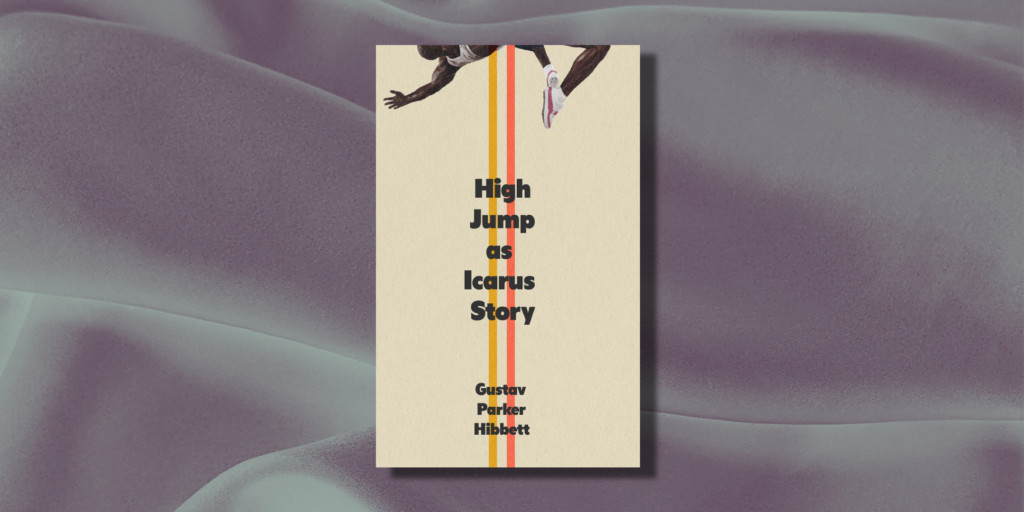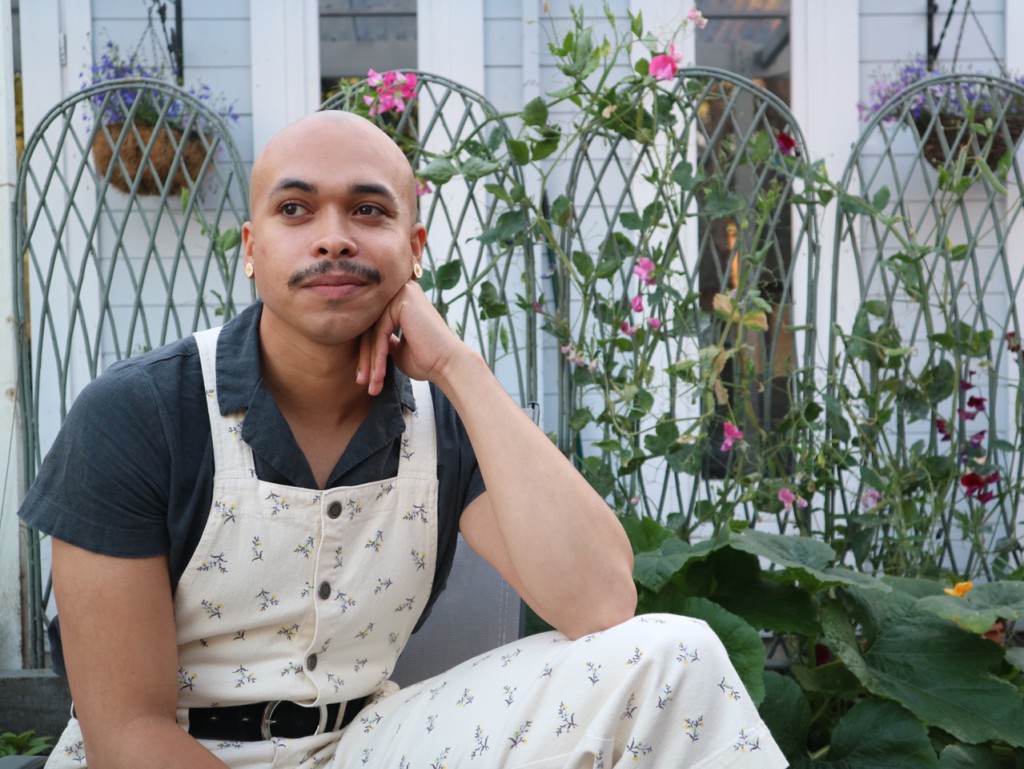Welcome to our Writers’ Notes for the 2024 T.S. Eliot Prize shortlist. These are educational resources for poets looking to develop their practice and learn from some of contemporary poetry’s most exciting and accomplished voices. Here’s Gustav Parker Hibbett on their collection High Jump as Icarus Story.

Sense of Self
I spent years waiting for someone else to make me a writer. Against the advice of many, I was pursuing a risky path, so I wanted a mentor, someone to show me how to do it right. I wanted to be transformed. I wanted to be taught to speak the kind of language people listened to.
I felt known in the wrong ways, understood incorrectly, and I believed that if I went off to an MFA, someone there would teach me how to make myself legible. There has long been a distance between how I understand the world and how it understands itself; between how the world understands me and how I understand myself. For so long, this felt insurmountable without an intervention of power. Language always felt like it was made for people other than me, made to hold other viewpoints better than it held mine. Whenever I tried to explain this, I failed to make myself understood. Over and over, my writing, my point of view, my self, failed to make itself understood. I felt that the world knew everything it wanted to know about me, and what it knew was wrong. But the world, the language, the story the world told about me in its language – all of this was louder than I was. I wanted to be heard, but it didn’t feel like I was good enough to convince anyone to listen. I had come to the MFA to learn how to beat this, but it was somehow even more pronounced here.
On Strategic Formation
Any writer who has grown up being Othered must overcome this. Relevant here is Edward Said’s idea of ‘strategic formation’, a term he uses in Orientalism to refer to ‘the way in which groups of texts, types of texts, even textual genres, acquire mass, density, and referential power among themselves and thereafter in the culture at large.’ There is a tradition to the way Black people are written and spoken about, whether it be in novels or academic journals or textbooks, and this tradition has acquired a mass that can be easily mistaken for ‘natural’ or commonly understood truth. Each text in a group of texts props up the others, confirms their veracity, creating a chorus of voices agreeing with themselves. Many non-Black people think Blackness is a certain way, because so many sources have aligned to tell them it’s that way. The same is true of queerness and queer people. The same is true, of course, of the way men write about women. And true, also, of any imbrication of marginalised identities. The idea is that other people are the authority on us, but that we are not even the authority on ourselves. This extends, I think, into any observation a writer might make from their relative positionality—a marginalised writer, on a variety of topics, can easily be made to feel as if they’re going against consensus. Their way of seeing the world, unmarked within their person, suddenly becomes a radical or controversial position as soon as it leaves them. It is easy to feel outnumbered, drowned out, disempowered. In pushing back against this, a marginalised writer’s language must become its own critical mass, capable of holding itself up, justifying itself.
Resistance
My resistance began with the first poem I decided to protect from workshop. I had opened up a truth about myself, something vulnerable, and I had put it on the page in a way that felt true to itself. It felt beautiful, and I didn’t want to destroy it. The poem was legible to me, true to the way I think and see, and I needed this to matter more than any compulsion to explain myself to an audience determined to misunderstand me. As far as this poem was concerned, I realised, I knew better than the workshop ever would. It worked because it worked for me, and this needed to be enough. I knew, almost somatically, that this poem was what I wanted it to be, and I decided to trust this sense.
Psychologists talk about how the membrane between the self and the world must be permeable, but not too permeable. One must have a strong enough sense of self not to get lost in the meeting between self and world. This is also true of writing. In my opinion, a strong sense of your own language—the way it naturally patterns itself, what words feel intimately true or false to you when you describe a scene or a feeling—is the most important thing for a budding writer to develop. Every other development is then guided by this internal sense of direction. Once you feel secure in your own work, it is much easier to set about improving it.
Permission
It is easy to get stuck here, though, in the self. How can you write like you if no one’s ever taught you how to represent the nuances of an off-centre self in writing? How can you break conventional language if you don’t yet understand which ways it can be broken? To find accommodation in language took me some searching. Finding my poetic compass wasn’t about shutting every single voice out; it was about figuring out which voices I wanted to listen to.
Important to this process were the writers who’d come into their own off-centre voices before me. It mattered less that their particular sense of the world was exactly the same as mine and more that they had a particular sense, that they’d found a way to express themselves on the page in a relationship that seemed to be one-to-one with their own particular mind.
Between Form and Content
For me, so much of this permission was granted by writers who expressed themselves in the generic space between prose and poetry. In their writing, every choice—whether it be line or paragraph breaks, word choice, paratactic associative logic, 1st versus 2nd versus 3rd person pronouns, white space – felt considered, intentional, there for a reason. Their form was tailor-made to fit their content, like they had deconstructed form themself and kept only the pieces that served a real purpose for them. The writers I considered part of this class were people like Gloria Anzaldúa, Maggie Nelson, Gwendolyn Brooks, H.D., Italo Calvino, Anne Carson, Claudia Rankine, and Theresa Hak Kung Cha.
Informed by what these writers taught me, I was able to approach poetry with an eye toward this interrelationship between form and content. Poetry is the form of writing where the writer has the most control over the elements of the page, and all of these writers primed me to be interested in this. Line length was up to me. Sentence structure was variable. Enjambment was a way to play with rhythm, specify which words to pause on, which to land on from above. Linearity was unnecessary. Selves were multiple, contradictory. The scales of reality were malleable based on emotional truths, weighted (finally!) in accordance with my own subjectivity. All of these were elements I could tune to match my own particular viewpoint, my own voice.
Poetic Style as Wardrobe
There are elements of play involved in finding a voice. A budding writer needs to create a space for themself where they can experiment, try on different pieces without fear of failing. For me, this kind of trust was critical.
For a while, I approached this play like a kind of puzzle. I would find something I liked in another writer’s work, something I wasn’t very good at, and I would need to write a poem that leaned on it as a primary device. This was a little like trying on new pieces of clothing. I wanted to see if I could make a bandana work. Or I wanted to see if I could pull off a frilly blouse. I needed to see if they fit with my body, with the other elements that were already part of my style.
Try Things On!
Ada Limón was really good at these narrow, column-like poems without stanza breaks, where the reader stumbled upon a sudden and epiphanic volta. I spent a while trying to style this mode my way. Or there was a period where I tried to figure out how to do a prose poem, and I looked at Claudia Rankine and Yanyi and Victoria Chang, studied what made theirs tick. For another while, I was interested in what could happen when I broke up the line, let space between individual words be part of the poem’s structure, and I looked toward Kemi Alabi, Karisma Price, and Richard Siken. Or there was this series of drunk early-morning Facebook messages that my friend David sent in college to another friend (about American football history and Miami and love) which were printed out and put on the bathroom stall wall as a found poem, and it worked – worked so well, even years later – and I needed to understand why. Then Dianne Seuss had this very specific rhythm to her language that I wanted to understand, so I tried on a variation of her voice in order to write lines that spilled forward with their own gravity. Or the art of the modern sonnet, where I looked toward Terrance Hayes and Wanda Coleman. Or Morgan Parker’s poignant, intelligent humour. Or SZA’s, for that matter: her ability to lull her listeners into a false sense of security with intimate humour and ghazal structure and then deliver an emotional gut punch. Then a carefully distilled style, like Victoria Adukwei Bulley or later work by Eavan Boland.
This feels important to me, this trying on of styles. Don’t we learn so much about our fashion sense by what we enjoy on others? I needed the space to try things on. I needed to learn how to wear things I saw others wearing. A budding writer – once they have a strong sense of themselves – shouldn’t be afraid to situate their work in new and unfamiliar places, because amidst the discomfort they will adapt elements of the place to fit them. These places, before they know it, will become home. These new styles, before they know it, will become routine. Their weaknesses will become their strengths. They will grow into themselves.
The Poetry School and T.S. Eliot Foundation have long collaborated on celebrating the T.S. Eliot Prize shortlist, highlighting this major fixture in the poetry calendar as a fantastic way into the art form and an opportunity to learn from poets at the top of their craft. This year we have a series of Writers’ Notes from the shortlisted poets, alongside a special one-off course with the fabulous Rachel Long, specifically focused on reading and writing after the shortlisted book, Adam by Gboyega Odubanjo. Additionally, we also have an exciting generative workshop exploring the whole shortlist as inspiration for new writing with T.S. Eliot Prize-winner, Joelle Taylor!

Gustav Parker Hibbett is a Black poet, essayist, and MFA dropout. They grew up in New Mexico and are currently pursuing a PhD at Trinity College Dublin. They are a 2024 Djanikian Scholars Finalist and a 2023 Obsidian Foundation Fellow, and their work has appeared in LitHub, Guernica, London Magazine, fourteen poems, Poetry Ireland Review, The Stinging Fly, and elsewhere. Their debut poetry collection, High Jump as Icarus Story (Banshee Press), was shortlisted for the 2024 T.S. Eliot Prize.
Add your Reply
You must be logged in to post a comment.